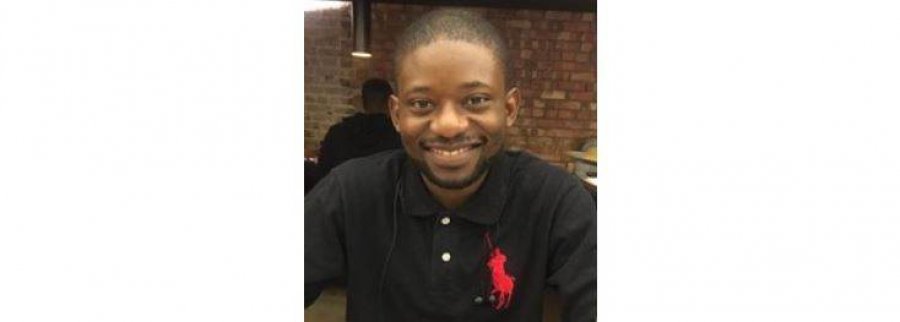60 seconds with Benjamin Momo Kadia
21 October 2020 London School of Hygiene & Tropical Medicine London School of Hygiene & Tropical Medicine https://lshtm.ac.uk/themes/custom/lshtm/images/lshtm-logo-black.png
October is Black History Month in the UK, an annual observance that celebrates and reflects on Black history, arts and culture, as well as recognising the achievements and roles of Black people in shaping history. LSHTM is committed to fostering a supportive, enabling and inclusive environment, where all individuals are treated with dignity and respect, and where there is equality of opportunity for all regardless of characteristics or background.
What is your role and what does it involve?
I was appointed as Clinical Research Associate at LSTM to provide clinical, research and organisational support to the Gut Health Workstream of the UKRI Global Challenges Research Fund (GCRF) Against Stunting Hub. Through extended on-site visits and remote assistance, I provide support in all aspects of the Workstream’s observational cohort and interventional studies in Senegal, India and Indonesia. I also have teaching and training responsibilities within the Department of Clinical Sciences of LSTM.
Where are you based?
Douala, Cameroon.
How long have you worked there (and what was your previous job)?
I started my role in October 2020, I am a physician general practitioner with four years of experience in delivering general medical services in rural Cameroon and in February 2020, I graduated with an MSc in Public Health for Development from LSHTM. After the MSc, I volunteered as Clinical Research Physician for diverse organisations including the Cameroon Society for Epidemiology and the Health Education and Research Organisation (HERO) in Cameroon. In addition, I assisted as a data work volunteer for LSHTM’s global database on public health and social measures against the COVID-19 pandemic. I also pursued independent research projects focusing on clinical and epidemiological aspects of tropical and infectious diseases.
What is a typical day for you?
Ordinarily, my day starts with jogging or walking to keep me fit. Then I usually have a meeting with my supervisor who leads the Gut Health Workstream of the Action Against Stunting Hub. During the meeting we set targets and update each other on the progress of the Gut Health Workstream, the Gut Health Research Group, the in-country teams in Senegal, Indonesia and India, and importantly, our involvement in projects of the Stunting Hub including interdisciplinary research. Occasionally, we also discuss another on-going project in Kenya as the delivery of this project informs some of our activities in the Gut Health Workstream. After the meeting, I engage in diverse virtual programmes including online training and webinars on gut health and related topics. I usually have breakfast by late morning, after which I focus on diverse tasks related to my role at LSTM. Broadly speaking, these tasks are geared towards overviewing and delivering the Gut Health Workstream and enhancing the research and teaching capacities of LSTM’s Department of Clinical Sciences.
Tell us about a project you are currently working on?
I am currently engaged in a prospective randomised trial assessing the effect of a synbiotic intervention from birth to age six months on linear growth and gut health biomarkers among infants in Senegal.
What three words would you use to describe your role?
Gastroenterology-Research-Collaboration.
What is your favourite thing about working there?
On a daily basis, I interact with new experts from diverse backgrounds and this tremendously expands my network and career opportunities.
What is your proudest career achievement?
Setting up a Continuing Medical Education Programme in all the hospitals where I practised medicine in Cameroon. I consider it a fundamental role of every clinician to create an environment that enhances knowledge sharing and evidence-based medicine among health personnel, especially in resource-limited settings.
What does Black History Month mean to you?
Celebrating the culture, history and achievements of the black community reaffirms our commitment to foster justice and equity worldwide.
What three words would you use to describe Black History Month?
Recognition-Enlightenment-Inspiration.
Who is your biggest inspiration?
My greatest inspiration and source of motivation is the people who believe in me. These people include family, friends, work colleagues, my patients etc. The list is not exhaustive. It is thanks to these people that I have kept my dreams alive and achieved every milestone in my career.
Who is someone making Black History today?
My little sister. To me, she has been a heroine ever since Cameroon started experiencing a series of crises, including the COVID-19 pandemic. During these uncertain times, this young woman has been merging her skills in public health and social entrepreneurship to empower women and vulnerable subgroups like internally displaced people. She has received diverse awards and recognitions for her work and recently got a Chevening Scholarship to study for an MSc in Disaster Management and Sustainable Development at Northumbria University in the UK.
“When I’m not working I am…”
Watching TV, listening to music or meeting up with friends.
What did you want to be when you were growing up?
I admired three main professions as I grew up; journalist, lawyer and then a teacher.
What three words would you use to describe yourself?
Calm-Visionary-Perseverant.
What is your favourite book?
The Gods Are Not to Blame by Ola Rotimi.
What is your most treasured possession?
My siblings. They fully understand who I am and my struggles and they have played a key role in getting me where I am.
What is your favourite joke?
The interrupting cow.
What is your favourite place?
Meiganga, a remote rural area in the Adamawa region of Cameroon. The area is full of greenery and beautiful sceneries. I feel at peace and in perfect harmony with nature when I visit this place. Meiganga really inspires my creativity and it is a great place for holidays for those who like forest walks.
What would it surprise people to know about you?
I hate breakfast.